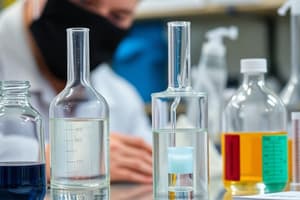Podcast
Questions and Answers
What is the first step of the scientific method?
What is the first step of the scientific method?
- Observation (correct)
- Experimentation
- Data analysis
- Hypothesis formation
Which of the following traits must a good hypothesis possess?
Which of the following traits must a good hypothesis possess?
- It must be testable and falsifiable. (correct)
- It must be based solely on assumptions.
- It should be vague and broad.
- It should only explain qualitative observations.
In experimentation, which variable is manipulated?
In experimentation, which variable is manipulated?
- Constant variable
- Confounding variable
- Independent variable (correct)
- Dependent variable
What is the outcome when a hypothesis is not supported after experimentation?
What is the outcome when a hypothesis is not supported after experimentation?
What differentiates a scientific law from a scientific theory?
What differentiates a scientific law from a scientific theory?
In the field of Chemistry, which of the following is primarily studied?
In the field of Chemistry, which of the following is primarily studied?
Which scientific attitude involves questioning ideas and evidence rigorously?
Which scientific attitude involves questioning ideas and evidence rigorously?
What is a qualitative observation?
What is a qualitative observation?
Flashcards
What is the scientific method?
What is the scientific method?
A systematic approach to understanding the natural world, involving observation, hypothesis formation, experimentation, data analysis, and conclusion. It's a cyclical process.
What is observation in science?
What is observation in science?
Gathering information about the natural world through the senses. It can be qualitative (descriptions with words) or quantitative (using numbers).
What is a hypothesis?
What is a hypothesis?
A testable explanation for an observation. It should be specific, measurable, and falsifiable. It predicts a relationship between variables.
What is an experiment?
What is an experiment?
Signup and view all the flashcards
What is data analysis in science?
What is data analysis in science?
Signup and view all the flashcards
What is a scientific conclusion?
What is a scientific conclusion?
Signup and view all the flashcards
What is a scientific theory?
What is a scientific theory?
Signup and view all the flashcards
What is a scientific law?
What is a scientific law?
Signup and view all the flashcards
Study Notes
Scientific Method
- Science is a systematic approach to understanding the natural world.
- It involves observation, hypothesis formation, experimentation, data analysis, and conclusion.
- The scientific method is a cyclical process—results from one cycle can lead to new observations and hypotheses.
Observation
- Observation involves gathering information about the natural world through the senses.
- Observations can be qualitative or quantitative.
- Qualitative observations are descriptions using words, while quantitative observations use numbers. Precise measurements are critical for quantitative observations.
Hypothesis Formation
- A hypothesis is a testable explanation for an observation.
- It should be specific, measurable, and falsifiable.
- A good hypothesis predicts a relationship between variables. A hypothesis is a proposed explanation, not a proven fact.
Experimentation
- Experiments are designed to test hypotheses.
- Experiments involve manipulating one variable (independent variable) and measuring another variable (dependent variable). Controlled variables are key to isolate the impact of the independent variable.
- Other variables are controlled to avoid confounding results. Controlling variables ensures that the experiment is repeatable.
Data Analysis
- Data analysis involves organizing and interpreting the results of experiments.
- Data can be presented in tables, graphs, or charts. Choosing appropriate graphs is crucial for visualising data patterns.
- Statistical analysis can be used to determine whether results are statistically significant, not just noticeable.
Conclusion
- A conclusion is a summary of the results of an experiment, and whether or not the hypothesis was supported.
- If the hypothesis is supported, it may lead to further investigation.
- If the hypothesis is not supported, a new hypothesis or experiment may be needed. Supporting or rejecting a hypothesis doesn't mean the end of the process.
Scientific Laws and Theories
- A scientific law describes a relationship between variables that is consistently observed in nature. Laws describe what happens.
- A scientific theory is a well-substantiated explanation of some aspect of the natural world, that can incorporate facts, laws, inferences, and tested hypotheses. Theories provide explanations.
- Scientific theories are supported by a vast body of evidence and are considered the most reliable explanations for phenomena. Multiple lines of evidence support a theory.
Branches of Science
- Biology: The study of living organisms.
- Chemistry: The study of matter and its properties, how matter changes, and the energy involved in these changes.
- Physics: The study of matter, energy, and their interactions.
- Earth Science: The study of Earth and its systems, including geology, meteorology, and oceanography.
- Astronomy: The study of celestial objects, space, and the universe.
Scientific Attitudes
- Curiosity: An interest in exploring the natural world.
- Skepticism: Questioning ideas and evidence rigorously.
- Objectivity: Avoiding bias in observations and interpretations.
- Creativity: Developing new ideas and approaches.
- Open-mindedness: Accepting new ideas and revising existing ones based on evidence.
- Perseverance: Continuing to investigate despite setbacks.
Importance of Science
- Advancements in technology and medicine.
- Understanding the universe and our place in it.
- Solving real-world problems and improving people's lives.
- Fostering critical thinking and problem-solving skills.
Scientific Literacy
- Scientific literacy involves understanding scientific concepts, processes, and the nature of science.
- It is essential for making informed decisions about various issues.
- Scientific literacy empowers individuals to evaluate scientific claims and evidence critically.
Studying That Suits You
Use AI to generate personalized quizzes and flashcards to suit your learning preferences.




